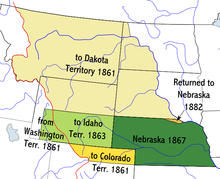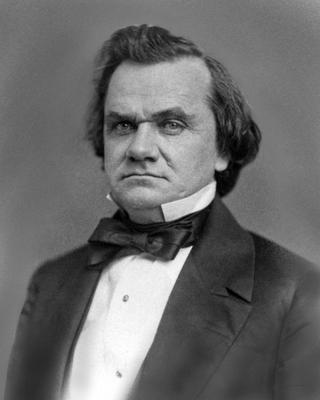| |||||
| Decades: | |||||
|---|---|---|---|---|---|
| See also: | |||||
Events from the year 1854 in the United States.
| |||||
| Decades: | |||||
|---|---|---|---|---|---|
| See also: | |||||
Events from the year 1854 in the United States.




David Rice Atchison was a mid-19th century Democratic United States Senator from Missouri. He served as President pro tempore of the United States Senate for six years. Atchison served as a major general in the Missouri State Militia in 1838 during Missouri's Mormon War and as a Confederate brigadier general during the American Civil War under Major General Sterling Price in the Missouri Home Guard. Some of Atchison's associates claimed that for 24 hours—Sunday, March 4, 1849, through noon on Monday—he may have been Acting President of the United States. This belief, however, is dismissed by nearly all scholars.

The Kansas–Nebraska Act of 1854 was a territorial organic act that created the territories of Kansas and Nebraska. It was drafted by Democratic Senator Stephen A. Douglas, passed by the 33rd United States Congress, and signed into law by President Franklin Pierce. Douglas introduced the bill intending to open up new lands to develop and facilitate the construction of a transcontinental railroad. However, the Kansas–Nebraska Act effectively repealed the Missouri Compromise, stoking national tensions over slavery and contributing to a series of armed conflicts known as "Bleeding Kansas".
1854 (MDCCCLIV) was a common year starting on Sunday of the Gregorian calendar and a common year starting on Friday of the Julian calendar, the 1854th year of the Common Era (CE) and Anno Domini (AD) designations, the 854th year of the 2nd millennium, the 54th year of the 19th century, and the 5th year of the 1850s decade. As of the start of 1854, the Gregorian calendar was 12 days ahead of the Julian calendar, which remained in localized use until 1923.

Bleeding Kansas, Bloody Kansas, or the Border War was a series of violent civil confrontations in Kansas Territory, and to a lesser extent in western Missouri, between 1854 and 1859. It emerged from a political and ideological debate over the legality of slavery in the proposed state of Kansas.

The Territory of Kansas was an organized incorporated territory of the United States that existed from May 30, 1854, until January 29, 1861, when the eastern portion of the territory was admitted to the Union as the free state of Kansas.
Timex Group USA, Inc. is an American global watch manufacturing company founded in 1854 as the Waterbury Clock Company in Waterbury, Connecticut. In 1944, the company became insolvent but was reformed into Timex Corporation. In 2008, the company was acquired by Timex Group B.V. and was renamed Timex Group USA.

James Murray Mason was an American lawyer and politician. He served as senator from Virginia, having previously represented Frederick County, Virginia, in the Virginia House of Delegates.

The 1854–55 United States House of Representatives elections were held in 31 states for all 234 seats between August 4, 1854 and November 6, 1855, during President Franklin Pierce's term. Each state legislature separately set a date to elect representatives to the House of Representatives before the 34th Congress convened its first session on December 3, 1855.

John Pettit was an American lawyer, jurist, and politician. A United States Representative and Senator from Indiana, he also served in the court systems of Indiana and Kansas.
The timeline of Kansas details past events that happened in what is present day Kansas. Located on the eastern edge of the Great Plains, the U.S. state of Kansas was the home of sedentary agrarian and hunter-gatherer Native American societies, many of whom hunted American bison. The region first appears in western history in the 16th century at the time of the Spanish conquest of the Aztec Empire, when Spanish conquistadors explored the unknown land now known as Kansas. It was later explored by French fur trappers who traded with the Native Americans. It became part of the United States in the Louisiana Purchase of 1803. In the 19th century, the first American explorers designated the area as the "Great American Desert."

The present-day state of Nebraska was still a territory of the United States during the American Civil War. It did not achieve statehood until March 1867, two years after the war ended. Nevertheless, the Nebraska Territory contributed significantly to the Union war effort.

Stephen Arnold Douglas was an American politician and lawyer from Illinois. A senator, he was one of two nominees of the badly split Democratic Party for president in the 1860 presidential election, which was won by Republican candidate Abraham Lincoln. Douglas had previously defeated Lincoln in the 1858 United States Senate election in Illinois, known for the pivotal Lincoln–Douglas debates. He was one of the brokers of the Compromise of 1850 which sought to avert a sectional crisis; to further deal with the volatile issue of extending slavery into the territories, Douglas became the foremost advocate of popular sovereignty, which held that each territory should be allowed to determine whether to permit slavery within its borders. This attempt to address the issue was rejected by both pro-slavery and anti-slavery advocates. Douglas was nicknamed the "Little Giant" because he was short in physical stature but a forceful and dominant figure in politics.
Events from the year 1861 in the United States. This year marked the beginning of the American Civil War.
Events from the year 1862 in the United States.
Events from the year 1807 in the United States.
Events from the year 1822 in the United States.
Events from the year 1855 in the United States.
1856 in the United States included some significant events that pushed the nation closer towards civil war.
Events from the year 1877 in the United States.

Events from the year 1911 in the United States.